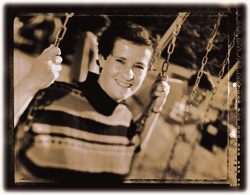Main Menu · Search · Current Issue · Contact · Archives · Centennial · Letters to the Editor · FAQs

When Sara Bennett learned at the age of 42 that she had breast cancer, she faced not one potential death but two--her own and that of the child she might never have. A few years ago, her only medical options would have been radiation and chemotherapy, treatments that destroy a woman's ovarian function along with her cancer.  Today, as a single woman, she could undergo IVF (in vitro fertilization) with donor sperm. Before starting her cancer therapy, she would receive fertility drugs and have anywhere from 10 to 20 eggs surgically removed. After being mixed with sperm in a coaster-size petri dish, her fertilized eggs would be frozen until she regained her health or enlisted another woman to be the gestational surrogate for her embryos. The latest advances in reproductive medicine could provide her with the opportunity to salvage her genetic legacy while she was fighting for her life.
Today, as a single woman, she could undergo IVF (in vitro fertilization) with donor sperm. Before starting her cancer therapy, she would receive fertility drugs and have anywhere from 10 to 20 eggs surgically removed. After being mixed with sperm in a coaster-size petri dish, her fertilized eggs would be frozen until she regained her health or enlisted another woman to be the gestational surrogate for her embryos. The latest advances in reproductive medicine could provide her with the opportunity to salvage her genetic legacy while she was fighting for her life.
But Bennett (a pseudonym) quickly discovered that a fertile woman with a life-threatening malignancy didn't fit the accepted profile of women eligible for infertility treatment. Clinic after clinic turned her away. Then she approached Selwyn Oskowitz, director of Boston IVF, one of three fertility clinics affiliated with Harvard Medical School. (The others are at Brigham and Women's Hospital and Massachusetts General Hospital.) "She expressed eloquently what it meant to her to be able to think that her genealogy could be carried on, and that a child of her own could find new life," recalls Oskowitz, assistant professor of obstetrics, gynecology, and reproductive biology at the medical school. He was moved by her appeal and brought it before Boston IVF's ethics advisory board.
Oskowitz believes Bennett "had been turned away from other clinics because she did not fit the narrow-minded social mores of who is infertile and who can be treated." Nevertheless, he says, her case "did bring up a whole host of ethical dilemmas. Should we use infertility treatments on someone who is not infertile? Should we freeze embryos for someone who may be dying, who may not be able to raise her child? Who will have custody of the embryos if she dies? If she wants the embryos to be placed with a surrogate, is it fair to the babies? Is it fair to the surrogate?"
Fertility specialists constantly face a barrage of ethical choices, and most clinics now have at least one advisory board. At Boston IVF, the priest, rabbi, ethicist, social workers, and pediatricians on the board reviewed Bennett's case, concluding that her wish to perpetuate her genetic heritage through IVF in spite of her cancer was ethically sound. They found her arrangements for the loving upbringing of her potential child by her family to be responsible, and she began IVF treatment.
 Infertility creates "tremendous strain on the couple," says Alice Domar of the Mind/Body Center for Women's Health.
Infertility creates "tremendous strain on the couple," says Alice Domar of the Mind/Body Center for Women's Health. |
Her eggs were retrieved and fertilized, but by this time Bennett had "personally arranged for a surrogate to carry her baby for her because she was too ill herself," says Oskowitz. The embryos were placed in the surrogate, but she did not conceive. Yet neither Bennett nor her doctors viewed the attempt as a loss. "We still feel, and she felt, that it was very successful in its value to her, to know that she could try to perpetuate her inner soul and all those feelings," reflects Oskowitz. "She felt that that gave her enormous strength and courage during her difficult treatments of chemotherapy and radiation. And that it enabled her to deal with the prospect of death in a more wholesome and productive manner." (Sara Bennett died last June, two months after this interview.)
Sara Bennett's case illustrates how far assisted reproductive technology, or ART (see "The Science of Assisted Reproduction"), has come in the past two decades, how many new applications of these therapies exist, and how vexing are the moral and social issues they entail. It also dramatizes what's at stake.
"When you take away being able to have a child biologically, it is like having to face death--almost like having half of you die," says Shanti Fry '73, M.B.A. '85, a corporate finance director at BancBoston Securities. She speaks from experience, for she tried unsuccessfully for eight years to get pregnant using the full range of infertility options. She and her husband, Jeff Zinsmeyer, are now the proud parents of their daughter Victoria, age 3, whom they adopted in China. Infertility may not be life-threatening in the literal sense, says Fry, "but it does affect people's view of their own mortality, because having kids is the main way that people deal with the fact that they are mortal. And it's very hard for people who haven't been through it to understand the magnitude of that."
Understanding and alleviating the psychological impact of infertility has been the decade-long goal of assistant professor of medicine Alice Domar, Ph.D., director of the Mind/Body Center for Women's Health at Beth Israel Deaconess Medical Center. She and her colleagues have demonstrated that women with infertility suffer from significantly more depression than do their fertile counterparts. But their most dramatic finding is that the anxiety and depression scores for infertile women are statistically equal to those of women with cancer, heart disease, or HIV.
 "I don't consider IVF to be a risk-free intervention," says Elizabeth Ginsburg, associate director of the IVF program at Brigham and Women's Hospital. She stands behind a reception area window; its central opening depicts an embryo dividing after fertilization.
"I don't consider IVF to be a risk-free intervention," says Elizabeth Ginsburg, associate director of the IVF program at Brigham and Women's Hospital. She stands behind a reception area window; its central opening depicts an embryo dividing after fertilization. |
Although reproductive specialists have long recognized the distressing effects of infertility, the medical profession has not generally accepted it as a condition that stacks up to "real" medical diagnoses. Domar notes that most American health insurance policies exclude infertility evaluation and treatment, suggesting that the country does not perceive infertility to be either a medical diagnosis or a significant life crisis (see "An Infertility Primer").
Yet infertility, whatever its biological cause, creates emotional havoc for those who want children. "Infertility affects every aspect of the patient's life," says Domar. While a couple experiences infertility, their siblings and friends are having babies. If their religion disapproves of ART, they may feel even more isolated. And infertility "creates tremendous strain on the couple," she says. "Men can come to feel like they're being used for their sperm," while a woman is "devastated emotionally." Domar once asked Diane Clapp, medical director of the national infertility organization Resolve, about this gender gap. "Men never get pregnant," Clapp answered. "Not getting pregnant for a man is the norm, whereas not getting pregnant for a woman is not the norm."
Annie Geoghegan, chief social worker for the Center for Reproductive Medicine at Brigham and Women's, looks at the issue developmentally. "We as women expect as a rite of passage to be able to have children when we choose," she says. "And when that gets interrupted, women feel defective." But Ruth Hubbard, professor of biology emerita and a longtime observer of the field, wonders, "How much has to do with the sense that, 'My gosh, I'm a healthy person. If cows can do this, why can't I?'" Shanti Fry, as president of Families with Children from China/New England, says she has observed equal distress in both sexes: "Men suffer just as much and just as deeply as women do."
Although infertility causes levels of depression equal to those associated with cancer, it doesn't elicit equal sympathy. "If you have cancer, you're going to get an outpouring of support," says Domar. "You're not going to hear, 'Just relax and your cancer will go away.' With infertility there's a subtle message that it's all your fault." People have been sensitized about other conditions, but such sensitization hasn't taken place for infertility, says Fry. "They distance themselves from you, as if it were catching. It's not catching."

Infertile couples who show up at clinics often feel desperate to have their own baby, and are willing to pay for the chance to do so. Given the costs--and uncertainties--extra care must be taken to counsel prospective patients honestly and appropriately for their particular situation, says Mark Hornstein '77, director of the in vitro fertilization program at Brigham and Women's. He advises infertility patients with extremely low odds not to pursue ART, but on the whole, "the chances that a couple will have a live birth in our program, taking all comers, is about one in four, depending on age." Hornstein, an assistant professor of ob-gyn and reproductive biology at the medical school, emphasizes that "every couple feels that they will get pregnant, regardless of how low their chances are and what they're told. And psychologically, that's a very important thing. To go through invasive, painful, somewhat risky procedures to have a child, you must believe it's going to work for you."
Domar, author of Healing Mind, Healthy Woman, believes psychological factors play an even more important role. "Can psychological symptoms, especially depression, hamper treatment success? I believe the answer is yes," she says. Studies demonstrate a 13 percent success rate if a woman is depressed before an IVF cycle versus a 29 percent success rate for those who are not depressed. Ten years ago, Domar established the first behavioral treatment program for infertility in the country, at Harvard's Mind/Body Medical Institute. In 10 weekly sessions, women (and, for three sessions, their partners) meet in a supportive group environment to learn about relaxation and stress-management techniques, nutrition and exercise, and how to cope with negative emotions. Domar and her colleagues are now in the midst of a five-year study, sponsored by the National Institute of Mental Health, to determine the efficacy of such treatment.
Critics contend that Domar is perpetuating the "relax-and-you'll-get-pregnant myth," but she sees her program as a supplement, not a substitute for traditional medical care. Her brand of treatment, in conjunction with conventional or assisted reproductive therapy, produces impressive results--a 37 percent "take-home baby" rate at last count. "I've always said that we consider pregnancy to be a nice side effect," says Domar. "What we do here is teach women skills which they can use to get their lives back. And if they happen to get pregnant because they got less depressed, that's great. But if they didn't get pregnant, they're still feeling better."
Main Menu ·
Search · Current Issue · Contact · Archives · Centennial · Letters to the Editor · FAQs
![]()